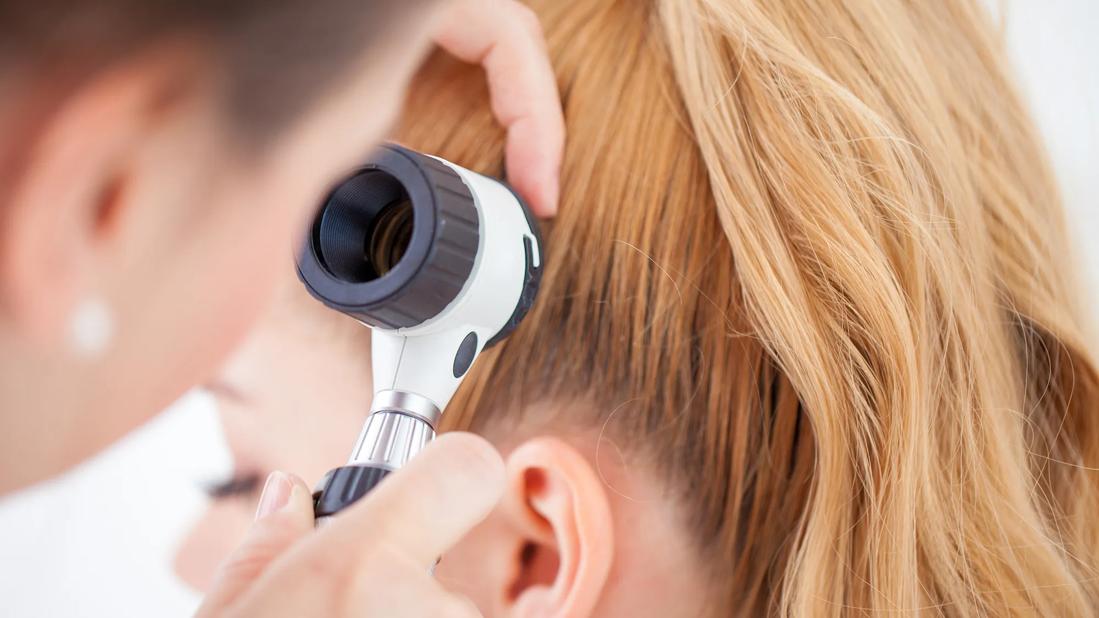Scalp cancers can occur because of long-term sun exposure

A thick, luscious head of hair doesn’t completely protect the skin of your scalp from skin cancer. In fact, skin cancer can develop wherever the light touches. And research shows that skin cancer, in general, is one of the most prevalent cancers in the world. So, the more you go outside without protection, the more you may run the risk of developing skin cancer in the future — even on your head.
Advertisement
Cleveland Clinic is a non-profit academic medical center. Advertising on our site helps support our mission. We do not endorse non-Cleveland Clinic products or services. Policy
Dermatologist Noreen Mohsin, MD, explains how skin cancer can form on your scalp and ways you can try to prevent it.
People who are light-skinned or bald are more prone to getting skin cancer on their scalp, but anyone can get it.
“Hair only provides partial protection against UV [ultraviolet] radiation, and cancer develops because of several factors,” says Dr. Mohsin.
Your risk for skin cancer on your scalp goes up depending on:
“We tend to see it in people who spend a lot of time outdoors in the summers and have been doing so for 50 or 60 years without a hat,” she adds.
In general, there are three common types of skin cancer you can get on your scalp.
Basal cell carcinoma is the most common type of skin cancer. It’s most common on the head and neck, and about 13% of all basal cell carcinomas develop on the scalp. This kind of cancer is often less noticeable than other types. It can appear on your scalp as:
Squamous cell carcinoma is the second most common type of skin cancer. Research shows that up to 20% of all squamous cell carcinomas are on the scalp.
Advertisement
“Squamous cell carcinomas are the ones that tend to rise up and be painful or bleed a lot,” notes Dr. Mohsin. “We often hear that people will find bumps that bleed while they’re at the barber or that their hair stylist will point these spots out to them while they’re getting their hair cut.”
Melanoma of the scalp accounts for nearly 20% of all melanomas and carries one of the highest mortality rates when found on the scalp. They’re often easily overlooked and can appear as:
You should have your scalp checked by a dermatologist if you find a lump or patch that’s:
Dr. Mohsin says another way to think about it is to follow the ABCDEs of skin cancer:
“If you notice any of these symptoms on your scalp, or if the spot is troubling you, make an appointment with a healthcare provider,” advises Dr. Mohsin. “We definitely recommend an evaluation if it’s bleeding, itchy or painful for more than a few days.”
If you’re worried about getting skin cancer on your scalp, there are things you can do to reduce your risk or improve your chances of catching it early:
“By relying on sun protection, being aware of new developments and raising concerns to a healthcare provider, you can potentially catch skin cancer early before it becomes a greater risk to your health,” encourages Dr. Mohsin.
Advertisement

Sign up for our Health Essentials emails for expert guidance on nutrition, fitness, sleep, skin care and more.
Learn more about our editorial process.
Advertisement

Rosemary oil’s antioxidant, anti-inflammatory and antimicrobial properties could help stimulate hair growth

Soften your skin with warm water and shaving cream before shaving with the grain of the hair

Age is the most likely reason for typical graying, but premature graying may be caused by stress, diet, smoking or autoimmune disease

Focus on nutrition, gentle styling habits and adapting to your hair type

How often you lather up your locks can depend on various factors, like hair type, age and ethnicity

Eating whole grains, salmon, fruits and vegetables can help you achieve longer, healthier locks

Your genes, ethnicity, diet and stress levels may all affect your facial hair

Your hair removal routine will depend on your pain tolerance, budget and skin sensitivities

Even small moments of time outdoors can help reduce stress, boost mood and restore a sense of calm

A correct prescription helps your eyes see clearly — but as natural changes occur, you may need stronger or different eyeglasses

Both are medical emergencies, but they are very distinct events with different causes